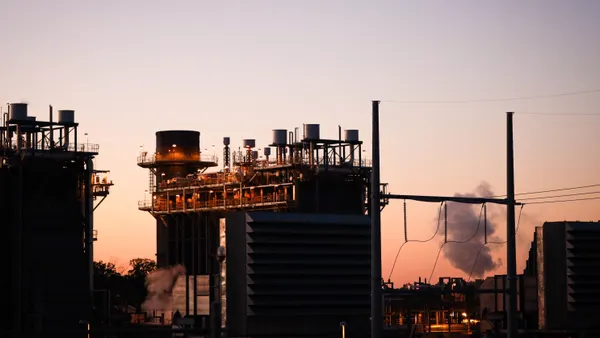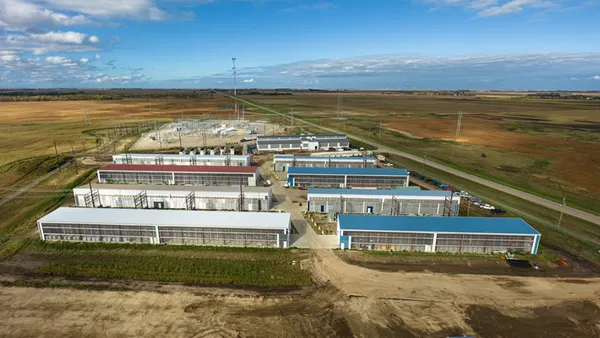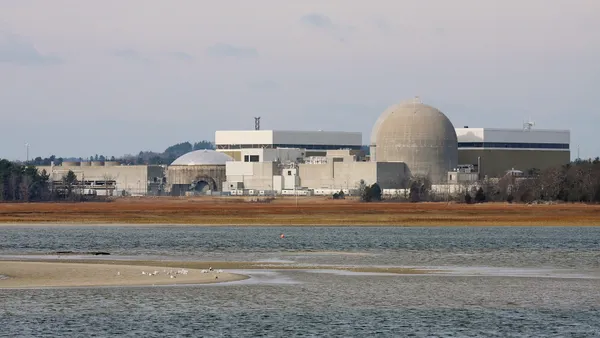Dive Brief:
-
Coal-fired power plants operated by regulated, vertically integrated utilities are less likely to be dispatched economically than units operated by merchant resources in the Midcontinent Independent System Operator (MISO) region, the grid operator's independent market monitor (IMM) found in a report presented to stakeholders on Thursday.
-
In total, the market monitor estimates a net operating revenue loss of $492 million from 2016 to 2019 — with $314 million lost from 2016 to 2018 and $178 million lost in 2019, though some of those losses were still considered efficient operations because of startup and shutdown costs. In its study of 2019 dispatch habits, the IMM found integrated utilities were the sole reason for the $178 million loss, $50 million of which was due to inefficient operations. "Basically all of … the not efficient, unprofitable decisions were made by integrated utilities," David Patton, MISO's IMM told stakeholders Thursday.
-
The majority of utilities in the region do operate economically and efficiently, but "[u]nfortunately, a small share of integrated utilities operate much less efficiently than others," the report found. Merchant generators are more likely to offer their resources economically and efficiently in the day-ahead market, the IMM found, and recommended integrated utilities follow that example.
Dive Insight:
Regulated utilities are less incentivized to dispatch their coal plants economically in the market because they can more easily recover losses incurred through their regulated rate base, studies have previously shown.
Resources are dispatched into the market based on price — a plant operator will make a net positive revenue as long as the cost of operating its facility remains below the market price of power. Plants are dispatched into the market either through offering them in the day-ahead market, where MISO dispatches those units on an economic basis, or forced through on a "must-run" basis, which means units are scheduled to operate regardless of economics.
Units that were unprofitable in the IMM's research did so through designating their units under a "must run" status even when the unit's operating expenses exceeded the market price for wholesale power.
There are also cycling costs associated with large coal plants, meaning it's more expensive to completely shut down and turn back on some of those facilities. That is why it is sometimes more efficient for a plant operator to keep a facility at a must-run status, even if it is losing money, the IMM said. He specifically distinguishes between efficient and inefficient operating losses, finding that units were unprofitable and inefficient 3% of the time from 2016 to 2018 and 4% of the time in 2019, representing an $84 million and $50 million net operating revenue loss, respectively.
Market prices were especially depressed in 2019 due to low natural gas prices, according to the IMM, leading to larger losses. And those losses were entirely attributable to integrated utilities.
"When we look at the merchant resources ... we find that they start economically 99% of the time," said Patton. "So their performance is a little better, and they tend to offer economically at a higher rate than the integrated utilities do."
The IMM broadly found 90% of coal dispatches in the MISO region were economic from 2016 to 2018, and 83% in 2019, leaving uneconomic operations to what Union of Concerned Scientists' Senior Energy Analyst Joe Daniel calls "a handful of really bad actors."
UCS in its own report found uneconomic self-commitments in the MISO region cost utilities $350 million in 2018, averaging $60 per customer. Another report from the Sierra Club found uneconomic commitments cost $3.5 billion from 2015 to 2017. The IMM characterizes its report as casting "serious doubts on the credibility of the recent studies asserting that MISO's coal-fired resources are routinely starting and operating uneconomically," though it doesn't specify what reports it is referring to.
But despite the cost discrepancies between the UCS, Sierra Club and IMM findings, Daniel, the lead author of the UCS report, said the IMM largely upheld UCS' central argument.
"The market monitor very plainly states that their results are in agreement with ours, that merchant power plants are not doing this and monopoly-owned utilities are engaging in uneconomic dispatch," he said. "UCS and others put it at a much higher price tag, but it's directionally the same."
Both the IMM and UCS studies also recommend utilities use merchant plants' strategy of day-ahead, seasonal dispatch to ensure their plants are operating as economically as possible. Xcel Energy in December filed with the Minnesota Public Utilities Commission to offer its two coal plants in the state on an economic basis instead of must-run, and found it could save customers tens of millions of dollars and 5 million tons of carbon emissions annually.
One reason why "almost all" of merchant plant decisions are efficient and economic, said Patton, is that they almost exclusively offer their units into the day-ahead market for economic dispatch.
"We think that strategy is valuable because to the extent that the day ahead market provides a good indication of market conditions going forward, … allowing the day ahead market to inform your decision to either start or to remain online will cause most of the decisions that you're making to be efficient," he said.














